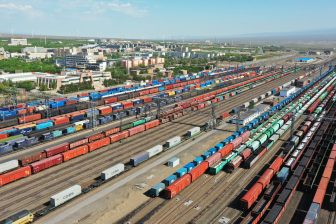
EU Sanctions impact China-Russia volume, but indirectly
Rail freight traffic between China and Russia will be impacted by the new list of EU sanctions, be it indirectly. This is what industry professionals told RailFreight.com. New sanctions were announced by the EU Commission last week and marked as the eleventh package since the Russia-Ukraine war. It includes anti-circumvention measures and other extended trade prohibitions, such as forbidding certain sensitive goods to transit from the EU via Russia.
The latest package highlights the need to tackle sanctions circumvention attempts that involve third countries. As a result, the sale, export, and transport of certain products from the EU to third countries suspected of being forwarded to Russia are restricted. The third countries that could provide possible circumvention logistic solutions stretch from the Far East to the Middle Corridor, and China cannot escape the spotlight.
Moreover, for eastbound cargo transiting via Russia to China, there are now more restrictions on the type of cargo permitted on the rail. Certain sensitive goods, such as advanced technology and aviation-related materials, will no longer be permitted to transit via Russia. To what extent do these two regulations impact China-Russia volumes on the rails? RailFreight.com gathered insights from two Chinese industrial experts.
Import shrinks
The sanctions already in place have already created an impact on import volumes from Russia to China, said Bria Liu, the founder of Toprail. According to her, the impact is manifested in the Russia-China train schedule: major destinations such as Xi’an, Chengdu, and Chongqing are reducing the number of eastbound train journeys.
However, the number of EU products imported to China via Russia are not so much affected. On the one hand, the sanction policies are fairly tolerable regarding transit. On the other hand, China isn’t targeted, said Liu. Jet Young, the Chinese representative of Eurasia Logistic LLC, agreed. «Those sanctioned goods themselves are not part of the China-Europe Express.»
Export declines
Chinese export volumes to Russia are also indirectly impacted by the sanctions. Russia’s economy is impacted by the EU sanction, resulting in an estimated drop of 2.1 per cent in 2022. Consequently, the products Russia can afford to import from China have decreased. The China-Russia express is now facing a dramatic price fall. «Since April, there has been a product shortage for trains heading to Russia from China, and these export rail freight rates have fallen back after the previous frantic increase,» Young explained.
For many rail freight forwarders, China-Russia volumes have become a lifesaving alternative to the decrease in China-Europe rail freight volumes. Can this traffic maintain its vitality for a longer time? Young isn’t so positive. «It is doubtful whether Russian purchasing power can be maintained and sustained to support imports under the impact of escalating sanctions».
Also read:
- Sanctions on China amidst Taiwan crisis: the next logistics puzzle to solve?
- 11th EU sanction package targets circumvention attempts
- No more transit of sanctioned goods in Turkey, for now



